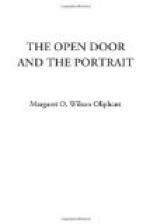Yet I thought there were signs in him of some perturbation. I met him one morning coming out of the room in which the portrait hung, as if he had gone to look at it stealthily. He was shaking his head, and saying “No, no,” to himself, not perceiving me, and I stepped aside when I saw him so absorbed. For myself, I entered that room but little. I went outside, as I had so often done when I was a child, and looked through the windows into the still and now sacred place, which had always impressed me with a certain awe. Looked at so, the slight figure in its white dress seemed to be stepping down into the room from some slight visionary altitude, looking with that which had seemed to me at first anxiety, which I sometimes represented to myself now as a wistful curiosity, as if she were looking for the life which might have been hers. Where was the existence that had belonged to her, the sweet household place, the infant she had left? She would no more recognize the man who thus came to look at her as through a veil, with a mystic reverence, than I could recognize her. I could never be her child to her, any more than she could be a mother to me.
* * * * *
Thus time passed on for several quiet days. There was nothing to make us give any special heed to the passage of time, life being very uneventful and its habits unvaried. My mind was very much preoccupied by my father’s tenants. He had a great deal of property in the town which was so near us,—streets of small houses, the best-paying property (I was assured) of any. I was very anxious to come to some settled conclusion: on the one hand, not to let myself be carried away by sentiment; on the other, not to allow my strongly roused feelings to fall into the blank of routine, as his had done. I was seated one evening in my own sitting-room, busy with this matter,—busy with calculations as to cost and profit, with an anxious desire to convince him, either that his profits were greater than justice allowed, or that they carried with them a more urgent duty than he had conceived.
It was night, but not late, not more than ten o’clock, the household still astir. Everything was quiet,—not the solemnity of midnight silence, in which there is always something of mystery, but the soft-breathing quiet of the evening, full of the faint habitual sounds of a human dwelling, a consciousness of life about. And I was very busy with my figures, interested, feeling no room in my mind for any other thought. The singular experience which had startled me so much had passed over very quickly, and there had been no return. I had ceased to think of it; indeed, I had never thought of it save for the moment, setting it down after it was over to a physical cause without much difficulty. At this time I was far too busy to have thoughts to spare for anything, or room for imagination; and when suddenly in a moment, without any warning, the first symptom returned, I started with it into determined




